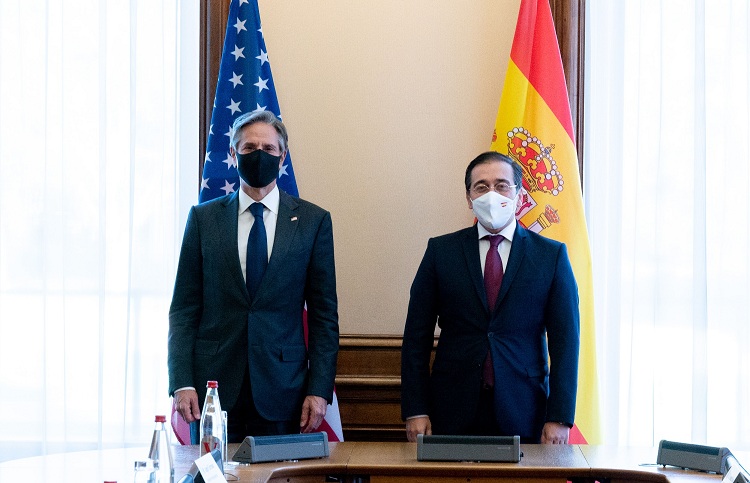Eduardo González
The Minister of Foreign Affairs, José Manuel Albares, held yesterday in Paris his first bilateral meeting with the US Secretary of State, Antony Blinken, with whom he spoke about the defense and strategic autonomy of the EU and about the need to address at the future NATO summit in Madrid a new “strategic concept” that “gathers the lessons of Afghanistan”.
“I have had my first meeting in person, at the request of the Secretary of State, Antony Blinken, after many conversations we have had and meetings by videoconference,” the minister told the Spanish media coinciding with the holding in Paris of the Ministerial Council of the Organization for Economic Cooperation and Development (OECD). The day before, and shortly before speaking at the Ministerial Council, Albares held a meeting with the White House Special Climate Envoy, John Kerry, with whom he discussed the upcoming COP26 and the role of Spain, the US and the European Union in the fight against climate change.
“Europe, at this time, has to make a reflection on its strategic autonomy and, obviously, the Europe of defense plays a fundamental role in this,” the minister continued yesterday. “We have to have an agreement on what Europe’s role in the world is going to be,” including in the Indo-Pacific region, and “once we have that decided, we obviously have to have a high-level dialogue with our natural ally, which is the United States,” he added.
“We have exchanged Secretary of State Blinken and I on that issue, on European defense, strategic autonomy and also the future NATO summit, which will take place in Madrid next year,” Albares said. In this regard, he explained, “we have agreed to work together so that this strategic concept, which is going to be called the ‘Madrid strategic concept’, includes all the lessons of recent years, including the lessons we have learned from Afghanistan”. Albares and Blinken already addressed the situation in Afghanistan, where the Taliban have regained power, during their last telephone conversation, which took place in early September.
“A pleasure to meet Spanish FM José Manuel Albares in Paris”, Blinken stated via his Twitter account. “Expressed my appreciation for Spain’s support for relocation efforts from Afghanistan. Also discussed how the U.S. and Spain can deepen our partnership in Latin America and on a wide range of global and regional issues”, he added.
Digital taxation and energy market
Regarding the ministerial meeting, José Manuel Albares explained that, during his speech on Tuesday, he had defended before his OECD counterparts the implementation of a digital taxation, because “we cannot face global challenges and a globalized economy if we have national taxation and we do not have transnational taxation”. “The negotiations that are currently taking place within the OECD are essential for our economies to remain competitive, for there to be transparency and for there to be reliability in all areas, including taxation,” he added.
He also recalled that Spain has put “on the table a proposal for a European energy and electricity market” with the aim of helping to reduce “the tension in the energy market, which goes beyond Spain and is happening in all the countries of the world”. In this regard, he said that this past Monday he had explained the Spanish proposal, “in detail”, to his French counterpart, Jean-Ives Le Drian, and that the latter had assured him that “France is in total harmony with this proposal”. “The Spanish government is doing everything necessary to be able to offer solutions to this situation and, in the case of the European energy market, what we need is the sum of all Europeans, many of whom are already in line with us,” he concluded.
The annual OECD Ministerial Conference, of which the United States holds the rotating presidency, concluded with the adoption of a declaration in defense of the “three elements” on which the OECD is based: constitutional democracy, open markets and respect for individual freedoms and human rights. In addition, the Conference marked the first presence of a senior US government official, Antony Blinken, in Paris since the formation of the alliance between the US, UK and Australia (AUKUS) which led to the termination of the Australian contract for the construction of submarines using French technology, a situation which has strained relations between Paris and Washington.
The meeting also coincided with the generalized increase in the prices of energy, raw materials and international shipping, which could affect the economic recovery after the pandemic (the OECD itself warned on September 21 that the recovery will be “uneven”), and with international discussions on the creation of a new fiscal framework based on taxes on large companies and the establishment of a minimum corporate tax rate of 15%.







